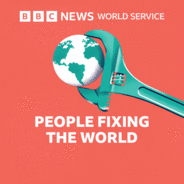What do you do in a medical emergency when the equivalent of 999 or 911 simply doesn’t exist? After spending time in countries that lack public ambulance services, US paramedic Jason Friesen realised the problem wasn’t a lack of sophisticated ambulances, or the hi-tech medical equipment inside them, but the communication system necessary to get an injured person from A to B in time to save their life. In the Dominican Republic there are no public ambulances but now, in two rural areas, first responders respond to a medical emergency as fast as any ambulance service in the developed world. And all it takes is one smartphone, a handful of willing volunteers, and an Uber-like text system that crowdsources help when disaster strikes.And Dougal Shaw meets the man who is pioneering a way to use recycled plastic to make stronger, longer lasting roads.Presenter: Sahar Zand
Reporters: Gemma Newby, Dougal Shaw.Image: First responders in the back of an ambulance / Credit: BBC

NachrichtenGesundheit, Wellness & Beauty
People Fixing the World Folgen
Brilliant solutions to the world’s problems. We meet people with ideas to make the world a better place and investigate whether they work.
Folgen von People Fixing the World
404 Folgen
-
Folge vom 09.05.2017Saving Lives with Text Messages
-
Folge vom 02.05.2017Greener In DeathThis is a story about what happens to your body after you die. In many countries, the current options are burial and cremation, but, both methods come with significant environmental impacts. We’re running out of space for burial in many places, and cremation carries the risk of toxins and greenhouse gases being released. For World Hacks, Sahar Zand travels to the US, where they’re using a new process to deal with the dead. It’s been called “green cremation,” “water cremation” or “resomation” and uses alkaline hydrolysis to mimic and accelerate the breakdown of tissue that would occur in burial. Those who invented the process say it’s an environmentally friendly way to address this fundamental moment in the human life-cycle, but does the evidence stack up?Reporter: Sahar Zand Presenter Mukul DevichandImage: A resomation machine / Caption: BBC
-
Folge vom 28.04.2017Helping Disabled People With SexHow do you fulfil your sexual needs if you have a disability? How do you masturbate if you have limited use of your hands? These are problems that most able-bodied people have probably never considered. But if you’re in this position it’s something you probably think about a lot. And it’s a problem which Vincent, the founder of a small NGO called Hand Angels, is trying to help with. His group matches volunteers with disabled people to provide a sexual service. Mukul Devichand and Alvaro Alvarez go to Taiwan to hear the remarkably frank stories of the volunteers and the receivers at the service. They open up a world of deep disappointment of those people who haven’t experienced sex or intimacy and an organisation that thinks it has the solution. But can any service ever fill this gap or is it just a shallow fix. Presenter: Mukul DevichandImage: Vincent – the founder of ‘Hand Angels’ / Credit: BBC
-
Folge vom 18.04.2017The Data DonatorsThe Data Donators Meet Becky. She suffers from arthritis and is in constant pain. Like lots of people – patients and doctors alike – she has a hunch that bad weather could be exacerbating the problem.It’s a question that has been asked for at least 2000 years, but we have never had the tools or resources to answer it. That is, perhaps, until now. Dr Will Dixon has set up a mass participation study that takes advantage of smartphone technology. More than 13,000 people have downloaded an app that has provided his team with a massive set of data, and by combing through it he hopes to answer the question once and for all. It’s not the only project of its kind, either. Around the world more and more people are launching similar projects – asking thousands of volunteers to donate their data for the greater good.Presenter: Mukul Devichand Reporter: Nick HollandImage: Overlay of highlighted bones of woman at physiotherapist / Credit: Shutterstock
